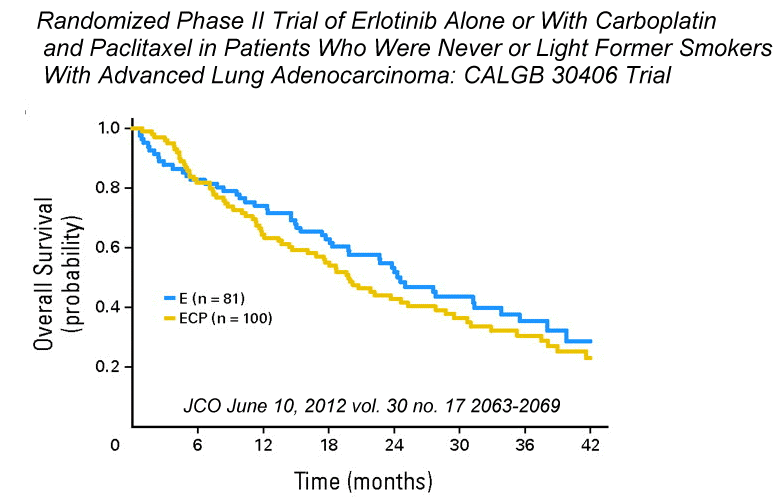
Non-small cell carcinoma of the lung (NSCL) which includes Squamous cell cancer,
Adenocarcinoma and Large cell carcinoma) is usually best treated with surgery (surgery). In some cases, to improve
the results, chemotherapy or radiation will be used before surgery (induction therapy) or after
surgery (postoperative radiation or adjuvant chemotherapy.)
Some studies show that chemoradiation works as well as surgery (go
here).
Cancer Genomics. The management of lung cancer is shifting to
targeted therapy based on the specific gene mutations that have occurred in
the cancer, For instance with adenocarcinoma if there is an EGFR (epidermal
growth factor) mutation then the targeted drug
erlotinib (Tarceeva)
would be used and for individuals with fusion of the ALK Gene (Anaplastic
Lymphoma Kinase) would be treated with
crizotinib (Xalkori). The NIH has a site (The
Cancer Genome Atlas) to keep researchers up to date on the rapid changes
in this field. To understand the genetic basis of cancer go
here.
In patients not felt to be suitable candidates for surgery, radiation alone may be used (go here for radiation alone) and (go here for all radiation topics) or more commonly radiation combined with chemotherapy (radiation plus chemotherapy #1 and #2).
Using very targeted doses of radiation may be as effective as surgery (see radiosurgery here and here), and see the article on Tomotherapy here and the Cyberknife section here.
There is evidence that more complex radiation techniques improve the results (go here).
In patients with more advanced or
incurable cancer chemotherapy alone (chemotherapy)
may be an option, but many of these patients will benefit from localized
(called palliative) radiation often with less side effects than chemotherapy
(go here). Some other studies (here).
Some specialized situations include
superior vena cava syndrome
(SVCO) or Pancoast Tumors or
Re-Treating with Radiation.
The main advantages of using Tomotherapy
can be shown treating a lung cancer patient, the beam can be targeted to
avoid normal lung and since the tumor is imaged everyday on CT scan, the
doctor can verify that the tumor is getting smaller (see video
here).
Small cell carcinoma is on another page (small cell).
